The IELTS Reading test demands a thorough comprehension of diverse topics, including current technological advancements. Today, we delve into the pertinence of artificial intelligence (AI) in enhancing energy efficiency. This topic has gained prominence in recent years due to its significant impact on both industries and the environment, making it a likely contender for future IELTS Reading passages. Let’s explore this subject in depth and provide a practice reading passage to help you prepare for the IELTS Reading test.
Table Of Contents
Practice Reading Passage on AI and Energy Efficiency
Reading Passage
Title: The Role of Artificial Intelligence in Enhancing Energy Efficiency
As global energy demands continue to rise, the urgency to discover sustainable energy solutions has never been greater. Artificial Intelligence (AI) has emerged as a powerful tool in the quest to improve energy efficiency across various sectors. This passage explores the innovative ways AI is being applied to enhance energy efficiency, from smart grids to predictive maintenance in industrial settings.
Smart Grids and Demand Response
AI has paved the way for the development of smart grids, which utilize advanced data analytics to monitor and manage energy consumption in real-time. By integrating renewable energy sources and storage systems with AI algorithms, smart grids can predict and balance energy loads more effectively. Demand response systems powered by AI can dynamically adjust energy usage based on peak demand times, reducing wastage and improving grid stability.
Predictive Maintenance
In industrial environments, equipment and machinery form the backbone of operations. AI-driven predictive maintenance uses data from sensors to forecast potential failures and schedule timely maintenance, thereby minimizing downtime and enhancing operational efficiency. For instance, AI can analyze the performance data of a wind turbine to predict when a component might fail and alert technicians to perform necessary repairs before a breakdown occurs.
Building Energy Management
AI’s role in building energy management is another crucial application. Through the use of machine learning algorithms, AI can optimize heating, ventilation, and air conditioning (HVAC) systems for maximum efficiency. These systems learn the occupancy patterns and preferences of the building’s inhabitants, adjusting temperatures and lighting accordingly to conserve energy while maintaining comfort.
Transportation and Logistics
The transportation sector is a major consumer of energy, and AI is playing a significant role in making it more efficient. Intelligent routing algorithms help in optimizing delivery routes, reducing fuel consumption and emissions. Moreover, AI is integral to the development of autonomous electric vehicles, which promise to further slash energy usage in the long run.
AI and Renewable Energy
The integration of AI with renewable energy sources such as solar and wind power is transforming the energy landscape. AI algorithms can predict weather patterns and optimize the performance of solar panels and wind turbines. By forecasting energy production and consumption, AI ensures that renewable energy resources are utilized efficiently and integrated seamlessly into the power grid.

Questions
-
Multiple Choice
- What is one function of AI in smart grids?
- A. Distributing renewable energy equally.
- B. Removing the need for storage systems.
- C. Predicting and balancing energy loads.
- D. Increasing peak demand times.
- What is one function of AI in smart grids?
-
Identifying Information (True/False/Not Given)
- Smart grids eliminate the need for human intervention.
- True
- False
- Not Given
- Smart grids eliminate the need for human intervention.
-
Matching Information
-
Match the following AI applications with their related sectors:
- AI-driven predictive maintenance
- Optimizing HVAC systems
- Intelligent routing algorithms
- A. Transportation
- B. Industrial settings
- C. Building energy management
-
-
Summary Completion
-
Complete the summary using the list of words below:
“In the quest for better energy efficiency, AI-driven 1 systems and 2 management in buildings are pivotal. Machine learning algorithms optimize 3 systems by learning 4 patterns.”Words: [demand response, HVAC, occupancy, operational, storage]
-
-
Short-answer Questions
- How does AI help in reducing fuel consumption in transportation?
Answer Key
-
Multiple Choice
- C. Predicting and balancing energy loads.
-
Identifying Information (True/False/Not Given)
- False
-
Matching Information
- 1 – B. Industrial settings
- 2 – C. Building energy management
- 3 – A. Transportation
-
Summary Completion
-
- demand response
-
- energy
-
- HVAC
-
- occupancy
-
-
Short-answer Questions
- By optimizing delivery routes with intelligent routing algorithms.
Common Mistakes in Reading Tests
- Misunderstanding the Context: Ensure you understand the passage context to answer True/False/Not Given questions correctly.
- Skipping Keywords: Pay close attention to keywords that change the meaning of a sentence.
- Overlooking Specific Details: Keep track of specific details mentioned in the passage, especially numbers, dates, and names.
Vocabulary
- Predictive Maintenance (n.) – /prɪˈdɪktɪv ˈmeɪntənəns/ – Maintenance carried out based on data-driven predictions of equipment failures.
- Optimization (n.) – /ˌɒptɪmaɪˈzeɪʃn/ – The action of making the best or most effective use of a situation or resource.
- Algorithm (n.) – /ˈælgərɪðəm/ – A process or set of rules to be followed in calculations or other problem-solving operations, especially by a computer.
Grammar Point
-
Relative Clauses: These clauses provide more information about a noun. For instance, “AI-driven predictive maintenance, which uses data from sensors,” provides more details about “predictive maintenance.”
Example: AI, which is used in many sectors, has improved energy efficiency.
Recommendations for Reading Practice
- Regular Practice: Engage with diverse reading materials, especially those related to technological advancements.
- Time Management: Practice managing your time effectively to answer all questions within the allotted time.
- Comprehensive Strategy: Develop a comprehensive reading strategy that includes skimming, scanning, and detailed reading.
By understanding how AI enhances energy efficiency and practicing with this passage, you can better prepare for your IELTS Reading test. Familiarize yourself with these kinds of topics as they are both current and relevant, thereby sharpening your reading skills and boosting your test confidence.